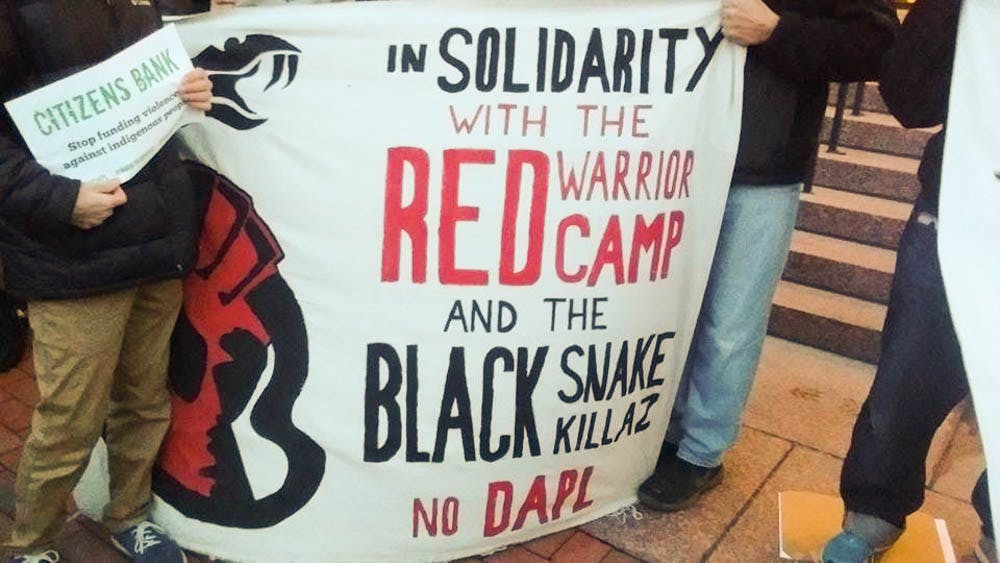In the wake of President Donald Trump’s announcement that he would resume construction of the Dakota Access Pipeline, indigenous organizers, tribal leaders and Providence community members protested the controversial pipeline in front of Citizens Bank Wednesday Feb. 8. Demonstrators argued that the DAPL would threaten area access to clean water, violate Native American tribes’ — specifically the Sioux tribe’s — treaty rights by unfairly impinging on tribal land and cultivating corporate greed at the expense of civilian welfare.
The protest was organized the day of an announcement that the Army Corps of Engineers would grant the final permission necessary to begin legal construction of the pipeline, which it approved Wednesday.
Trump’s revival of the pipeline does not come as a surprise. As early as December, he said that he supported completing the pipeline, which spans four states and may carry as many as 550,000 barrels of oil per day to Illinois from its starting point in North Dakota.
Trump owned stock in the company constructing the pipeline, Energy Transfer Partners, according to an article published in the New York Times. Though a Trump spokesman announced last month that he had sold all of his stock in June, Trump has not provided documentation confirming the completion of the sale.
Protesters gathered at Citizens Bank, which has a revolving loan and an open line of credit in place with the company constructing the DAPL, said Nick Katkevich, one of the protest’s organizers and co-founder of the Fighting Against Natural Gas Collective. Organizers had attempted to meet with bank representatives earlier that day but were escorted out of the building by police, Katkevich said. He encouraged the public to withdraw their deposits from the bank to pressure Citizens to listen to public concerns.
Julz Rich, who demonstrated at Standing Rock in 2016 and was the first woman to chain herself to a construction vehicle there, spoke to the crowd about the intergenerational nature of the issue. The land on which the DAPL would be constructed has belonged to native people for hundreds of years and construction on it would violate a collective history, Rich said. She added that the DAPL threatens future generations of Native Americans who deserve clean water.
DAPL construction stalled during the final weeks of the Obama administration, with the USACE blocking construction Dec. 4.
“This a big gesture of (the Trump administration) not caring about the future,” said protestor Edward Foster. Desire to protect the environment and secure clean drinking water in the United States motivated him to join the protest, he said, as well as his opposition to the emerging policies of the Trump administration.
As the protest continued, police officers approached the protesters and asked them to move to a different spot in front of the bank.
“How’re you going to ban someone on land you stole? This bank doesn’t own this land. Those cops over there don’t own this land,” Rich said. Other speakers referenced more examples of stolen lands, emphasizing that the phenomenon is not limited to DAPL construction. The city of Providence itself rests on land that rightfully belongs to native tribes, multiple speakers said.
While protesters and speakers expressed fear at the Trump administration’s recently announced policies, one female protester expressed hope at the level of political engagement she has seen in recent weeks: “I’ve never been so blown away to see the power in the people.”





